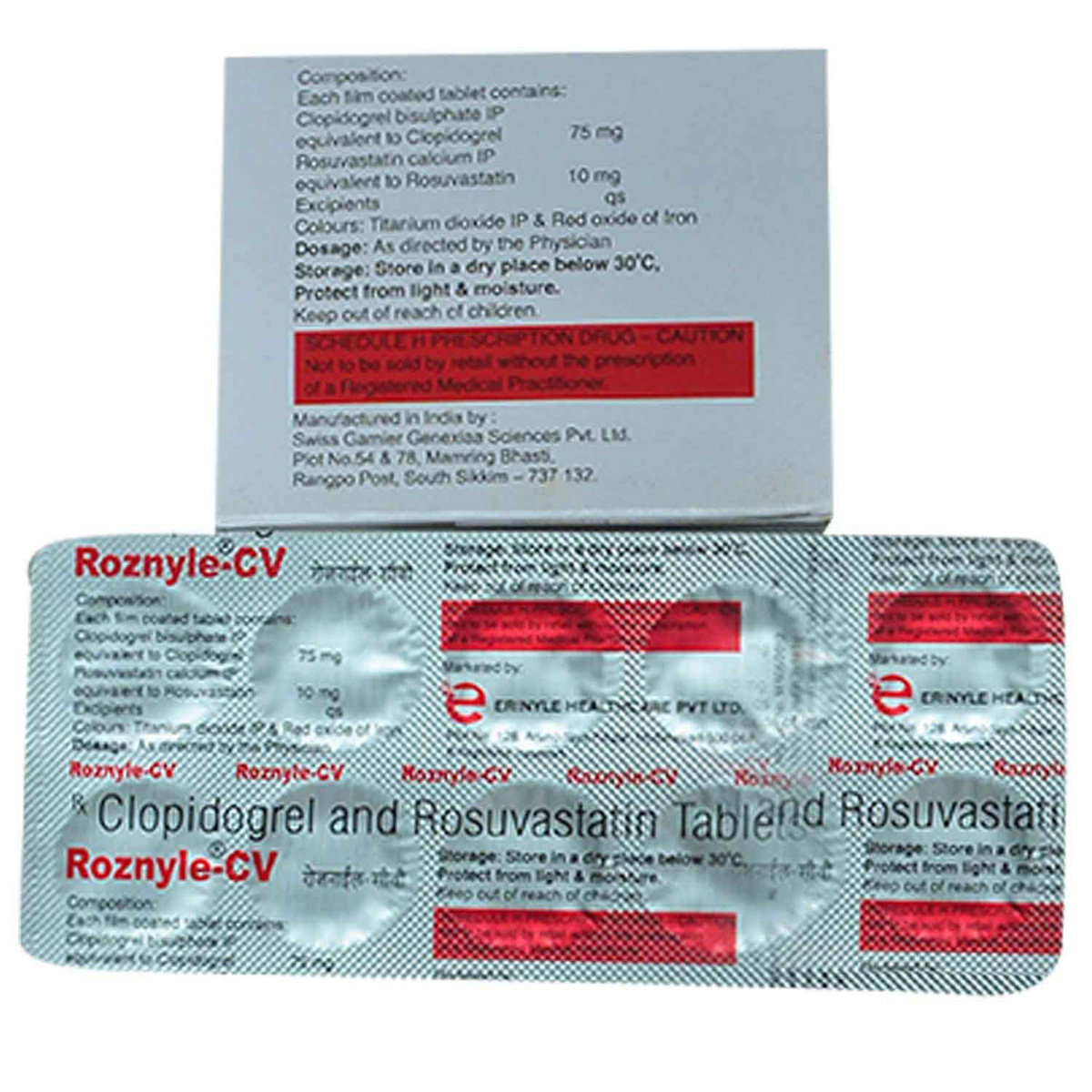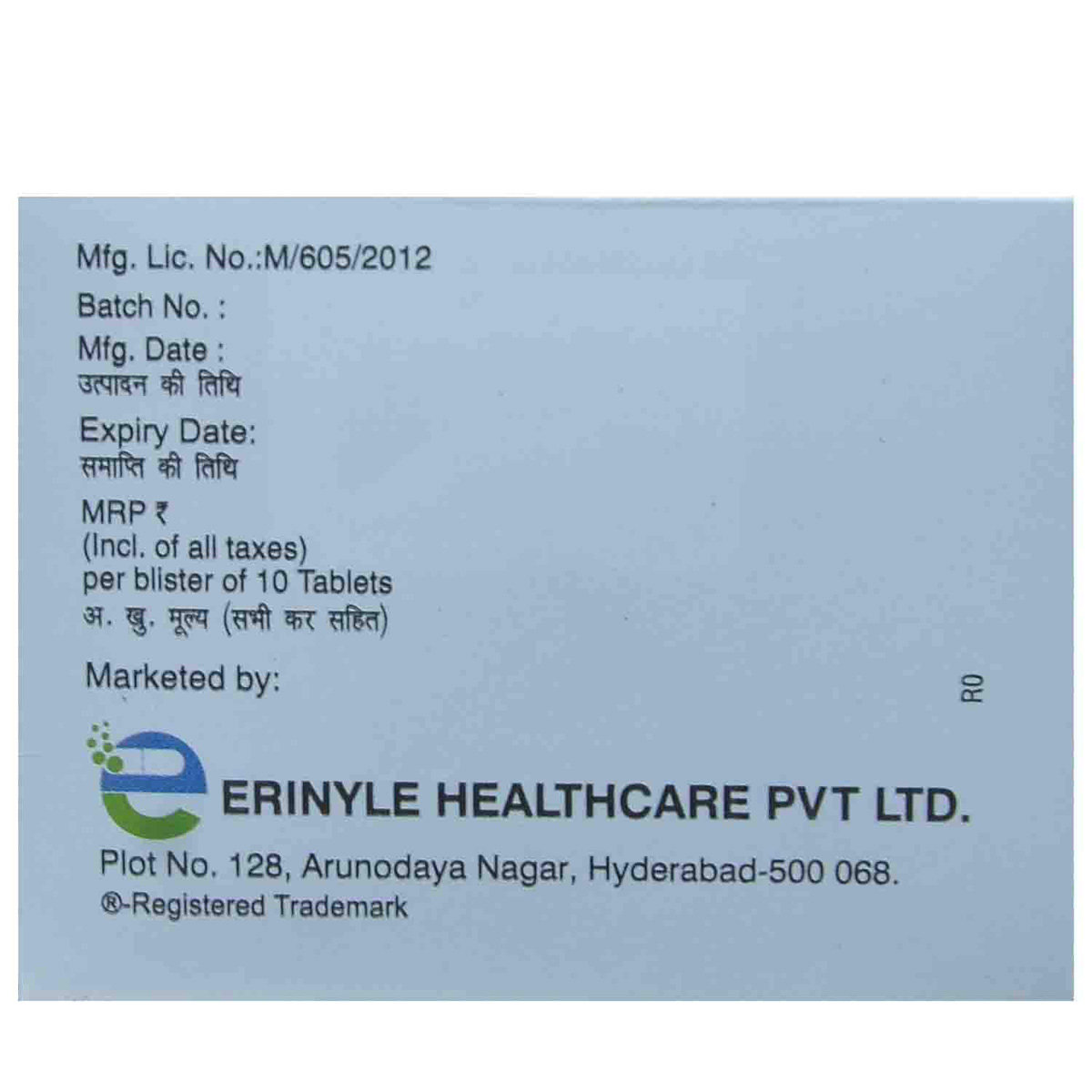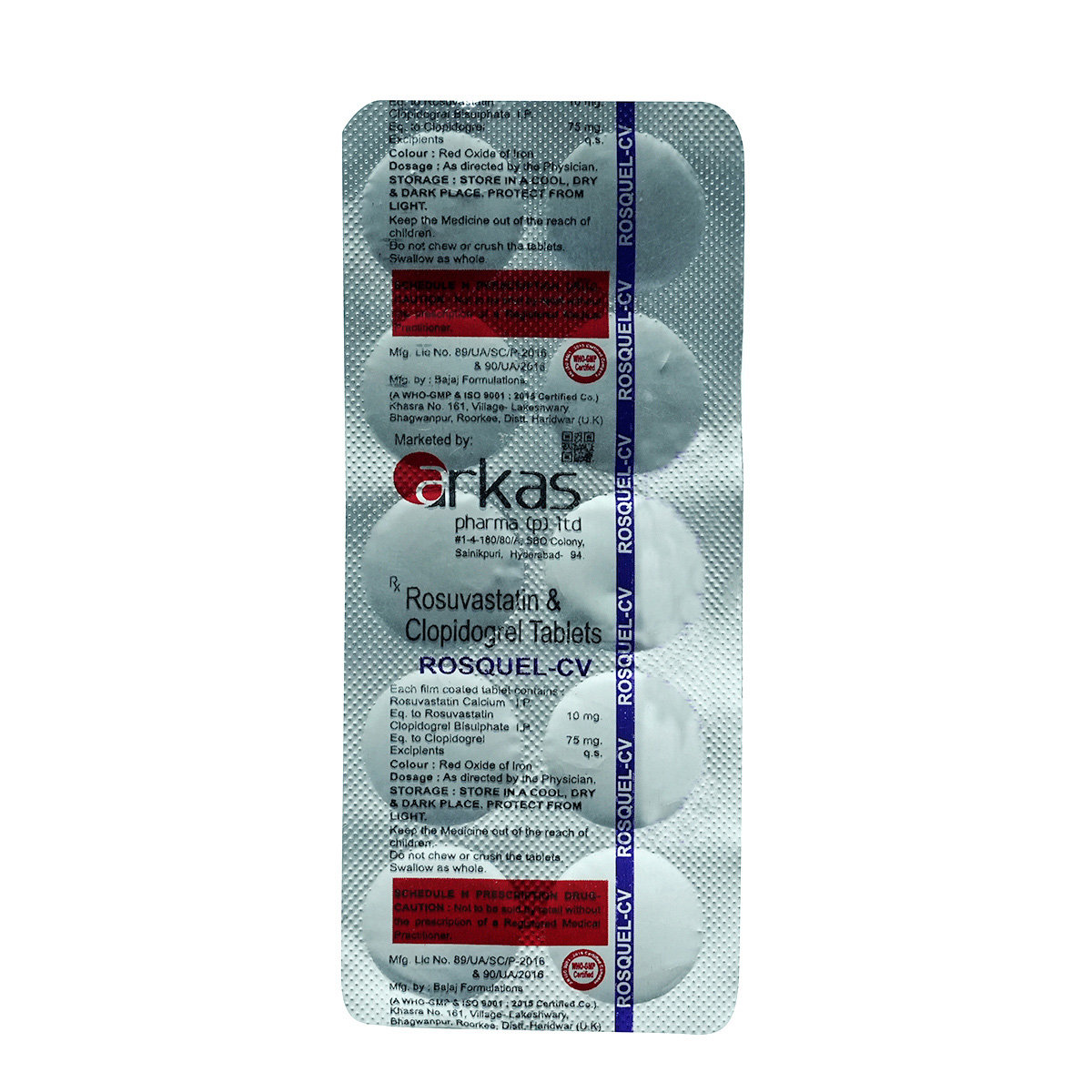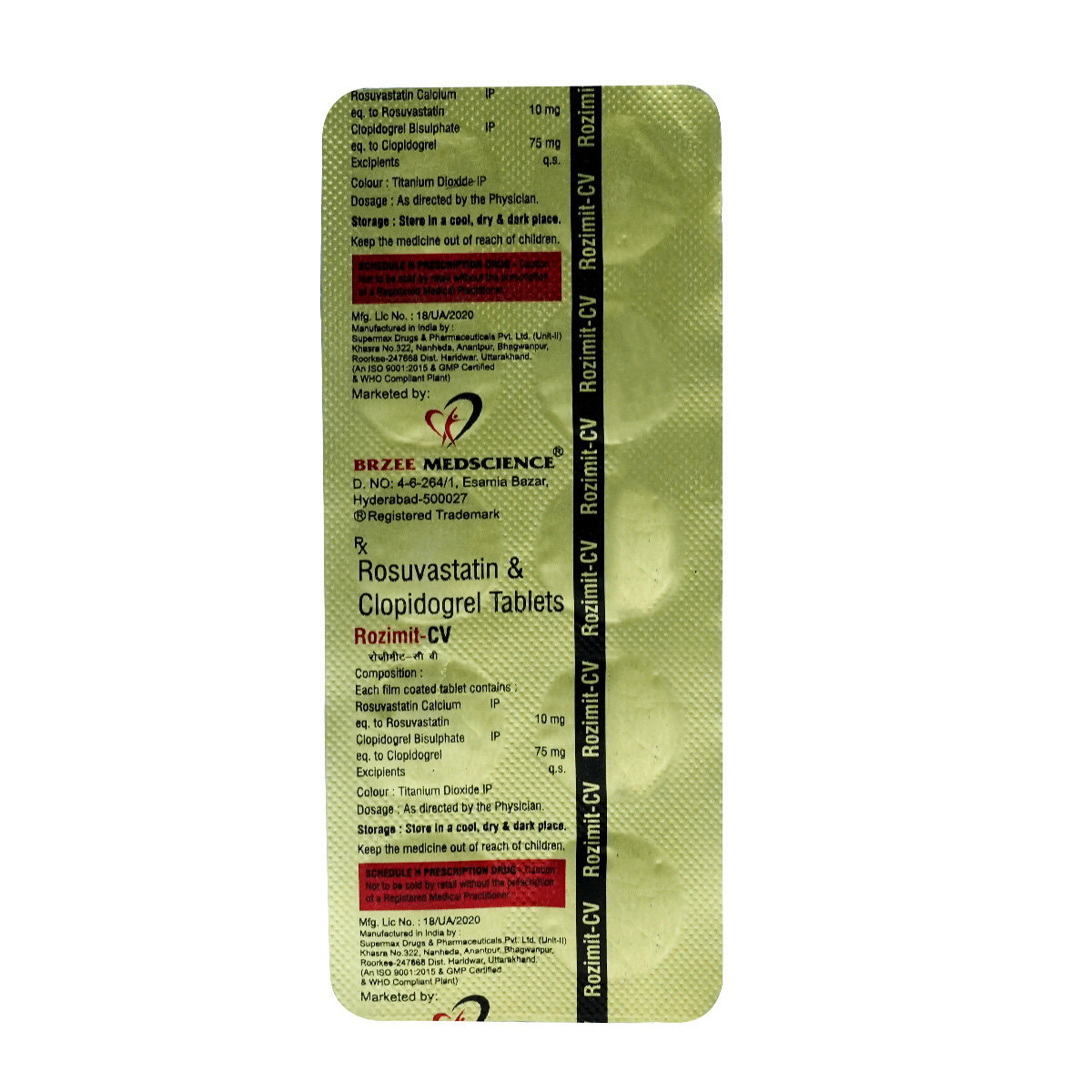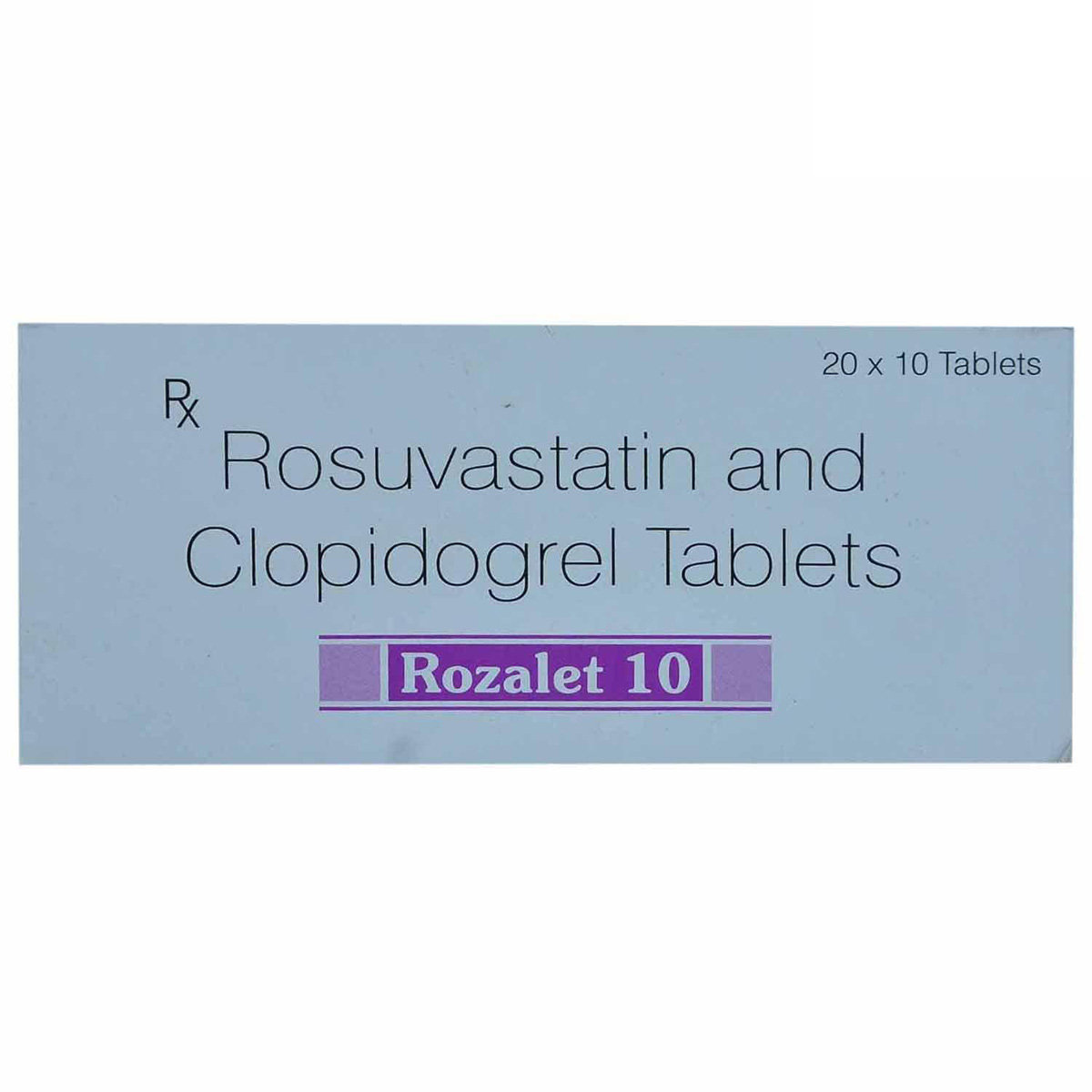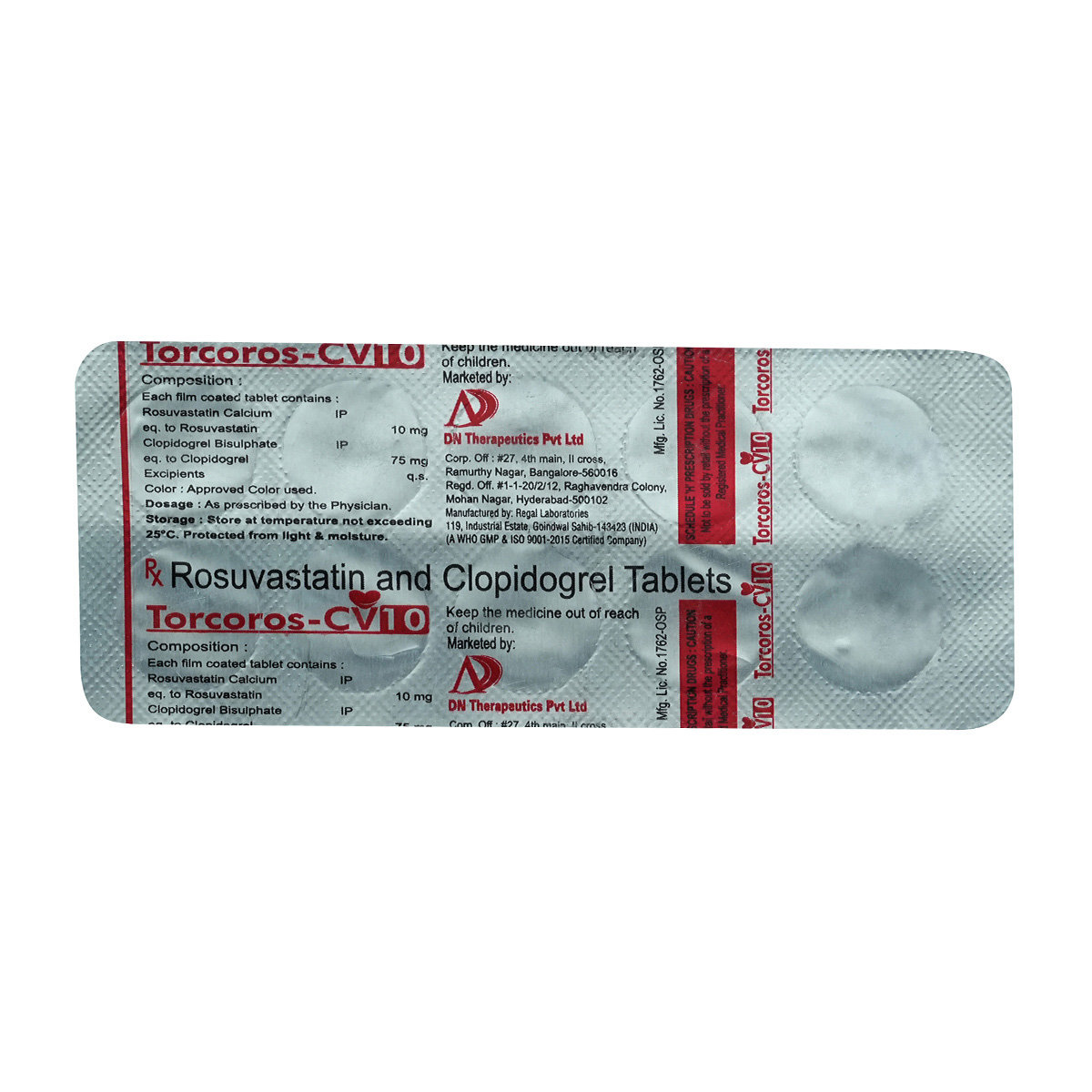Roznyle-CV Tablet 10's
MRP ₹178
(Inclusive of all Taxes)
₹26.7 Cashback (15%)
Provide Delivery Location
Online payment accepted
 Prescription drug
Prescription drugWhats That
Composition :
Manufacturer/Marketer :
Consume Type :
Expires on or after :
Return Policy :
About Roznyle-CV Tablet
Roznyle-CV Tablet is a combination drug composed of a blood-thinning agent and cholesterol-lowering agent, primarily used to prevent heart attack and stroke in the future. It lowers the raised level of cholesterol and fats (triglycerides) in our body. A heart attack is a condition in which your coronary arteries (blood vessel supplying blood and oxygen to the heart) becomes blocked due to build-up of fats (plaque) including cholesterol. These plaques narrow the arteries, leading to atherosclerosis and coronary artery disease, mainly for most heart attacks.
Roznyle-CV Tablet is composed of two medicines, namely: Rosuvastatin and Clopidogrel. Rosuvastatin is a lipid-lowering medication that blocks the enzyme required to make cholesterol in the body. As a result, it lowers the bad cholesterol (low-density lipoproteins or LDL), triglycerides (TG) and increases the levels of good cholesterol (high-density lipoproteins or HDL). Clopidogrel is a blood thinner (anticoagulant) that collectively prevents a clot in the blood vessels. Together Roznyle-CV Tablet reduces the increased levels of bad cholesterol (low-density lipoprotein and triglycerides) and prevents blood clots, thereby reducing and preventing the risk of heart attack, stroke and heart-related chest pain (angina).
Take Roznyle-CV Tablet exactly as directed by your doctor. The dose and duration of Roznyle-CV Tablet may differ depending on the reason why you're taking it and your responses to treatment. In some cases, you may experience headaches, ankle swelling due to fluid retention (oedema), slow heart rate, and nausea. Roznyle-CV Tablet is known to cause dizziness, so driving should be avoided. Most of these side effects of Roznyle-CV Tablet do not require medical attention and gradually resolve over time. However, if the side effects are persistent, reach out to your doctor.
Try not to stop taking Roznyle-CV Tablet of your own. Suddenly stopping Roznyle-CV Tablet may worsen your condition and increase your risk of a future heart attack. Inform your doctor know if you are allergic to rosuvastatin, clopidogrel, or have any active liver disease (liver enzymes abnormalities), active bleeding issues (like peptic ulcer, brain haemorrhage), or muscle problem (myopathy, rhabdomyolysis). The patient should inform the doctor that they are taking Roznyle-CV Tablet before any surgery is scheduled or any new medicine is taken. Rosuvastatin present in Roznyle-CV Tablet is a pregnancy category X drug, so it should not be given to pregnant women. It may cause harm to the fetus if administered to pregnant or breastfeeding women.
Uses of Roznyle-CV Tablet
Directions for Use
Key Benefits
Rosuvastatin is a lipid-lowering medication that blocks the enzyme required to make cholesterol in the body. As a result, it lowers the bad cholesterol (low-density lipoproteins or LDL), triglycerides (TG) and increases the levels of good cholesterol (high-density lipoproteins or HDL). Clopidogrel is a blood thinner (anticoagulant) that collectively prevents a clot in the blood vessels. Together Roznyle-CV Tablet reduces the increased levels of bad cholesterol (low-density lipoprotein and triglycerides) and prevents blood clots, thereby reducing the risk of heart attack, stroke, and heart-related chest pain (angina).
Storage
- Report to Your Doctor: Inform your doctor about the muscle pain, as they may need to adjust your medication.
- Stretch Regularly: Gentle stretching can help relieve muscle pain and stiffness.
- Stay Hydrated: Adequate water intake supports muscle health by removing harmful substances and maintaining proper muscle function.
- Warm or Cold Compresses: Apply cold or warm compresses to the affected area to reduce pain and inflammation.
- Rest and Relaxation: Adequate rest helps alleviate muscle strain, while relaxation techniques like deep breathing and meditation can soothe muscle tightness, calm the mind, and promote relief from discomfort.
- Gentle Exercise: Participate in low-impact activities, such as yoga or short walks, to improve flexibility, reduce muscle tension, and alleviate discomfort.
- Consult a physician: If your symptoms don't improve or get worse, go to the doctor for help and guidance.
- Please inform your doctor about joint pain symptoms, as they may adjust your medication regimen or prescribe additional medications to manage symptoms.
- Your doctor may prescribe common pain relievers if necessary to treat joint discomfort.
- Maintaining a healthy lifestyle is key to relieving joint discomfort. Regular exercise, such as low-impact sports like walking, cycling, or swimming, should be combined with a well-balanced diet. Aim for 7-8 hours of sleep per night to assist your body in repairing and rebuilding tissue.
- Applying heat or cold packs to the affected joint can help reduce pain and inflammation.
- Please track when joint pain occurs and any factors that may trigger it, and share this information with your doctor to help manage symptoms.
- If your joint pain is severe or prolonged, consult a doctor to rule out any underlying disorders that may require treatment.
- Drink water or other clear fluids.
- To prevent worsening of pain, limit intake of tea, coffee, or alcohol.
- Include bland foods like rice, toast, crackers, and rice in your diet.
- Avoid lying down immediately after eating as it may cause indigestion or heartburn.
- Avoid acidic and spicy food as it may cause indigestion.
- Inform your doctor about the nausea and discuss possible alternatives to the medication or adjustments to the dosage.
- Divide your daily food intake into smaller, more frequent meals to reduce nausea.
- Opt for bland, easily digestible foods like crackers, toast, plain rice, bananas, and applesauce.
- Avoid certain foods that can trigger nausea, such as fatty, greasy, spicy, and smelly foods.
- Drink plenty of fluids, such as water, clear broth, or electrolyte-rich beverages like coconut water or sports drinks.
- Use ginger (tea, ale, or candies) to help relieve nausea.
- Get adequate rest and also avoid strenuous activities that can worsen nausea.
- Talk to your doctor about taking anti-nausea medication if your nausea is severe.
- Record when your nausea occurs, what triggers it, and what provides relief to help you identify patterns and manage your symptoms more effectively.
- Inform your doctor about your constipation symptoms. They may adjust your medication or advise alternative treatments.
- Stay hydrated by drinking sufficient of water (at least 8-10 glasses a day) to help soften stool and promote bowel movements.
- Increase fibre intake by eating foods high in fibre, such as fruits, whole grains, vegetables and legumes, to help bulk up the stool.
- Establish a bowel routine by trying to go to the bathroom at the same time each day to train your bowels.
- Engaging in regular exercise, like walking or yoga, can support in bowel movement stimulation.
- Consult your doctor if constipation persists, and discuss alternative treatments or adjustments to your medication.
- Hydrate your body: Drink enough water to prevent dehydration and headaches.
- Calm Your Mind: Deep breathing and meditation can help you relax and relieve stress.
- Rest and Recharge: Sleep for 7-8 hours to reduce headache triggers.
- Take rest: lie down in a quiet, dark environment.
- Cold or warm compresses can help reduce tension.
- Stay Upright: Maintain good posture to keep symptoms from getting worse.
- To treat headaches naturally, try acupuncture or massage therapy.
- Over-the-counter pain relievers include acetaminophen and ibuprofen.
- Prescription Assistance: Speak with your doctor about more substantial drug alternatives.
- Severe Headaches: Seek emergency medical assistance for sudden, severe headaches.
- Frequent Headaches: If you get reoccurring headaches, consult your doctor.
- Headaches with Symptoms: Seek medical attention if your headaches include fever, disorientation, or weakness.
- Inform your doctor about dizziness symptoms. They may adjust your medication regimen or prescribe additional medications to manage symptoms.
- Follow your doctor's instructions for taking medication, and take it at the same time every day to minimize dizziness.
- When standing up, do so slowly and carefully to avoid sudden dizziness.
- Avoid making sudden movements, such as turning or bending quickly, which can exacerbate dizziness.
- Drink plenty of water throughout the day to stay hydrated and help alleviate dizziness symptoms.
- If you're feeling dizzy, sit or lie down and rest until the dizziness passes.
- Track when dizziness occurs and any factors that may trigger it, and share this information with your doctor to help manage symptoms.
Drug Warnings
Tell your doctor if you are allergic to rosuvastatin, clopidogrel, or any of its ingredients. If you have any active liver disease, active bleeding issues (like peptic ulcers, brain haemorrhage), pregnant, or plan to become pregnant or breastfeeding, do not take Roznyle-CV Tablet until prescribed. The patient should inform the doctor that they are taking Roznyle-CV Tablet before any surgery is scheduled or any new medicine is taken. Rosuvastatin present in Roznyle-CV Tablet is a pregnancy category X drug, so it is contraindicated in pregnant women. As it may cause harm to the fetus if administered to pregnant women. The risk of muscle problems might increase if Roznyle-CV Tablet is taken with an antibiotic (clarithromycin), anti-HIV drugs (ritonavir, lopinavir, darunavir, atazanavir, indinavir) and antifungal (itraconazole). Coadministration with anticoagulants like warfarin may cause gastric bleeding and other bleeding problems. So, if you are using any blood-thinning agents, let your doctor know about this. Roznyle-CV Tablet contains rosuvastatin, which can cause muscle problems like myopathy and rhabdomyolysis. Patients with active liver disease should use the Roznyle-CV Tablet with caution. Safety and effectiveness of Roznyle-CV Tablet have not been established, so its use should be avoided in paediatric patients less than ten years of age. Discontinuation of Roznyle-CV Tablet may lead to cardiovascular events like heart attack, stroke, and angina (heart-related chest pain). Hence, you should consult a doctor before stopping the dose of Roznyle-CV Tablet .
Drug-Drug Interactions
Drug-Drug Interactions
Login/Sign Up
Taking Roznyle-CV Tablet together with mifepristone increases the risk of vaginal bleeding in women.
How to manage the interaction:
Although taking Roznyle-CV Tablet with mifepristone is not recommended, that would certainly result in interaction, it can be taken if a doctor prescribes it. If you experience prolonged and heavy bleeding, consult a doctor immediately. Do not discontinue any medication without consulting a doctor.
When Selexipag and Roznyle-CV Tablet are taken together, the body's ability to break down Selexipag may be reduced.
How to manage the interaction:
Taking Roznyle-CV Tablet with Selexipag is not recommended, please consult your doctor before taking it. They can be taken if prescribed by your doctor.
Co-administration of Roznyle-CV Tablet with lenalidomide may increase the risk of a rare condition called rhabdomyolysis (breakdown of skeletal muscle tissue).
How to manage the interaction:
Although there is an interaction between lenalidomide and Roznyle-CV Tablet, it can be taken if prescribed by a doctor. However, if you experience muscle pain, tenderness, or weakness, consult the doctor immediately. Do not discontinue any medications without consulting a doctor.
Co-administration of Roznyle-CV Tablet and amprenavir can increase the blood levels of Roznyle-CV Tablet and can increase the risk of liver damage and rhabdomyolysis( breakdown of skeletal muscle tissue).
How to manage the interaction:
Co-administration of Roznyle-CV Tablet and Amprenavir can lead to an interaction, it can be taken if advised by your doctor. However, if you experience any symptoms like muscle pain, tenderness, weakness, dark-colored urine, fever, chills, joint pain or swelling, unusual bleeding or bruising, skin rash, itching, loss of appetite, fatigue, nausea, vomiting, and yellowing of the skin or eyes, consult the doctor immediately. Do not stop using any medications without a doctor's advice.
Co-administration of Roznyle-CV Tablet and Fenofibrate can increase the blood levels of Roznyle-CV Tablet and can increase the risk of liver damage and rhabdomyolysis(breakdown of skeletal muscle tissue).
How to manage the interaction:
Co-administration of Roznyle-CV Tablet and Fenofibrate can lead to an interaction, it can be taken if advised by a doctor. However, if you experience any symptoms like muscle pain, tenderness, weakness, dark-colored urine, fever, chills, joint pain or swelling, unusual bleeding or bruising, skin rash, itching, loss of appetite, fatigue, nausea, vomiting, and yellowing of the skin or eyes, consult the doctor immediately. Do not stop using any medications without a doctor's advice.
Coadministration of Nicotinamide with Roznyle-CV Tablet may increase the risk and severity of side effects like rhabdomyolysis (breakdown of skeletal muscle) or kidney damage which can be fatal.
How to manage the interaction:
Taking Nicotinamide with Roznyle-CV Tablet together can result in an interaction, but it can be taken if your doctor has advised it. If you notice any symptoms like unexplained muscle pain, muscle stiffness or tenderness, fever, dark-coloured urine, or weakness, you should contact your doctor immediately. Do not stop using any medications without first talking to your doctor.
Co-administration of Saquinavir and Roznyle-CV Tablet can increase the blood levels of Roznyle-CV Tablet and can increase the risk of developing liver damage and rhabdomyolysis(breakdown of skeletal muscle tissue).
How to manage the interaction:
Co-administration of Saquinavir and Roznyle-CV Tablet can lead to an interaction, it can be taken if advised by your doctor. However, if you experience any symptoms like muscle pain, tenderness, weakness, dark-colored urine, fever, chills, joint pain or swelling, unusual bleeding or bruising, skin rash, itching, loss of appetite, fatigue, nausea, vomiting, and yellowing of the skin or eyes, consult the doctor immediately. Do not stop using any medications without a doctor's advice.
Co-administration of Roznyle-CV Tablet and Darunavir can increase the blood levels of Roznyle-CV Tablet and can increase the risk of liver damage and rhabdomyolysis(breakdown of skeletal muscle tissue).
How to manage the interaction:
Co-administration of Roznyle-CV Tablet and Darunavir can lead to an interaction, it can be taken if advised by your doctor. However, if you experience any symptoms like muscle pain, tenderness, weakness, dark-colored urine, fever, chills, joint pain or swelling, unusual bleeding or bruising, skin rash, itching, loss of appetite, fatigue, nausea, vomiting, and yellowing of the skin or eyes, consult the doctor immediately. Do not stop using any medications without a doctor's advice.
Co-administration of Roznyle-CV Tablet and Atazanavir can increase the blood levels of Roznyle-CV Tablet and can increase the risk of liver damage and rhabdomyolysis( breakdown of skeletal muscle tissue).
How to manage the interaction:
Co-administration of Roznyle-CV Tablet and Atazanavir can lead to an interaction, it can be taken if advised by your doctor. However, if you experience any symptoms like muscle pain, tenderness, weakness, dark-colored urine, fever, chills, joint pain or swelling, unusual bleeding or bruising, skin rash, itching, loss of appetite, fatigue, nausea, vomiting, and yellowing of the skin or eyes, consult the doctor immediately. Do not stop using any medications without a doctor's advice.
Coadministration of colchicine and Roznyle-CV Tablet may increase the risk of conditions that affect your muscles and kidneys.
How to manage the interaction:
Taking Colchicine with Roznyle-CV Tablet may possibly result in an interaction, but they can be taken together if prescribed by your doctor. However, contact your doctor immediately if you experience abdominal discomfort, nausea, vomiting, diarrhea, back pain, weakness, or tingling or numbness in your hands and feet. Do not discontinue any medication without consulting your doctor.
Drug-Food Interactions
Drug-Food Interactions
Login/Sign Up
Diet & Lifestyle Advise
- A low cholesterol diet and a regular exercise regime effectively complement treatment with Roznyle-CV Tablet .
- Stick to a freshly prepared home-cooked meal and avoid processed, packed foods that contain hidden sugar and extra calories.
- Try to replace most of your saturated fats with unsaturated fats to reduce total cholesterol and LDL cholesterol (bad cholesterol) quickly.
- Foods like avocados, olive oil, fatty fish, and nuts contain too many heart-healthy unsaturated fats, so eating them regularly is beneficial.
- Include a diet enriched in fats like fish oils, polyunsaturated oils, and omega-3 fatty acids, which are good for heart health.
- Quit smoking and avoid excessive intake of alcohol.
Side Effects of Roznyle-CV Tablet
- Stomach bleeding
- Gastrointestinal bleeding
- Nose bleeding
- Rash
- Diarrhoea
- Stomach ulcer
- Muscle disease (myopathy, rhabdomyolysis)
- Abdominal pain
Habit Forming
Therapeutic Class
All Substitutes & Brand Comparisons
RX
Rosuson-CV 10 Tablet 10's
Unison Pharmaceuticals Pvt Ltd
₹56
(₹5.04 per unit)
68% CHEAPERRX
Out of StockRosupack-CV Tablet 30's
Koye Pharmaceuticals Pvt Ltd
₹191
(₹5.73 per unit)
64% CHEAPERRX
Rosubeat CV 10 Tablet 10's
Zenolia Life Science Pvt Ltd
₹112.5
(₹10.13 per unit)
36% CHEAPER
Drug-Diseases Interactions
Drug-Diseases Interactions
Login/Sign Up
FAQs
Drug-Drug Interactions Checker List
- ERYTHROMYCIN
- CLARITHROMYCIN
- RITONAVIR
- LOPINAVIR
- DARUNAVIR
- ATAZANAVIR
- INDINAVIR
- ITRACONAZOLE
- WARFARIN
- HEPARIN
- COLCHICINE
- DIGOXIN
- CYCLOSPORINE
Disease/Condition Glossary
Heart attack: Heart attack is when your coronary arteries (blood vessels supplying blood and oxygen to the heart) become blocked due to the build-up of fats (plaque), including cholesterol. These plaques narrow the arteries, leading to atherosclerosis and coronary artery disease, mainly for most heart attacks.
Stroke: Stroke occurs when the blood and oxygen supply to the brain is blocked or minimized. As a result, the brain tissue is deprived of getting oxygen and nutrients. After a few minutes, brain cells (neurons) start to die. A stroke is a medical emergency; immediate treatment is required; else can cause brain damage, coma or even death.
Atherosclerosis: Atherosclerosis occurs when fats, cholesterol, and other substances known as plaque deposit on your artery walls that restrict blood flow. This plaque formation triggers blood clots, narrows the artery's size, and hardens it. This, in turn, can lead to various heart complications like atherosclerosis, heart attack, heart-related chest pain (angina), and stroke. However, it can also affect the body's arteries apart from the heart.

Have a query?
Alcohol
Safe if prescribed
Roznyle-CV Tablet should not be taken with alcohol as it may worsen your liver condition with increased secretion of liver enzymes like transaminase. Keep your doctor informed if you drink alcohol.
Pregnancy
Consult your doctor
Roznyle-CV Tablet contains Rosuvastatin, which is a pregnancy category X medicine. It may cause harm to both the pregnant mother and the fetus. Hence, it is not recommended for pregnant women and those who are planning for a pregnancy. Your doctor might prescribe you only in an extreme case.
Breast Feeding
Consult your doctor
Take Roznyle-CV Tablet only when prescribed, it is known to pass on in a limited quantity via breast milk to the child.
Driving
Safe if prescribed
Drive with caution, Roznyle-CV Tablet usually causes blurry vision and may affect driving ability.
Liver
Consult your doctor
Roznyle-CV Tablet to be taken with caution, especially if you have a history of liver diseases/conditions. The dose may have to be adjusted by your doctor.
Kidney
Consult your doctor
Roznyle-CV Tablet to be taken with caution, especially if you have a history of kidney diseases/conditions. The dose may have to be adjusted by your doctor.
Children
Safe if prescribed
Roznyle-CV Tablet is not recommended for children below the age of 10 years. The safety and effectiveness of Roznyle-CV Tablet have not been established in children due to limited testing of Roznyle-CV Tablet on children by competent authorities worldwide.
Recommended for a 30-day course: 3 Strips

